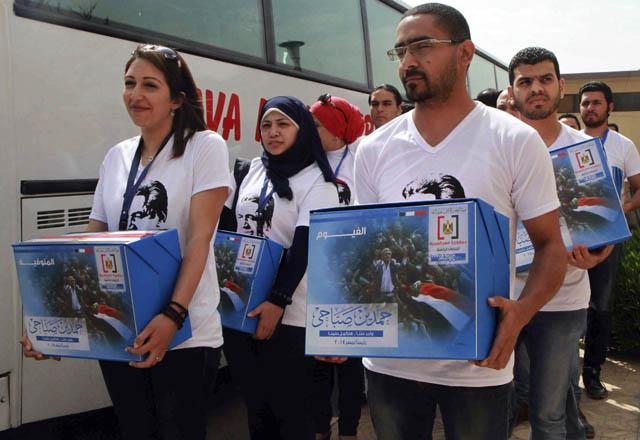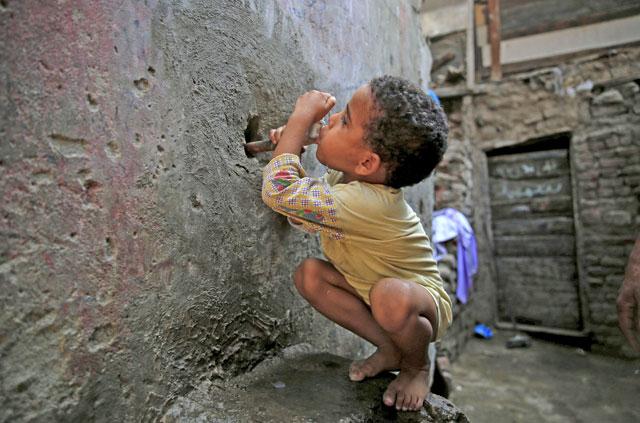CAIRO — Egypt’s military killed 16 suspected Islamic militants in a series of air strikes on hideouts in the northern Sinai Peninsula, a spokesman said Saturday, alleging that the fighters had ties to the ousted president’s Muslim Brotherhood group.
The military has been waging a wide offensive against militant groups in Sinai, where they have solidified their position since the country’s 2011 uprising.
Militancy spread to central Cairo and Nile Delta cities over the past months in retaliation for the military’s July ouster of Islamist president Mohamed Morsi after millions demanded his resignation.
Col. Ahmed Mohammed Ali said on his official Facebook page that the air strikes targeted hideouts of “terrorist, extremely dangerous takfiri” militants late Friday in the eastern border town of Sheikh Zuweyid. Takfiri is an Arabic term referring to Islamic radicals.
He described the targeted militants as affiliated with the “terrorist” Brotherhood group. The group denies links to terrorism but the military-backed government has branded it a terrorist organisation, amid wave of heavy-handed crackdown on its leadership, members and supporters. Hundreds have been killed and thousands are in detention mostly over crimes of inciting violence.
The Friday air strikes were the fourth with such a high death toll, and are part of a stepped-up operation since militants shot down a military helicopter in a nearby area on January 24.
Friday’s deaths bring the total number of militants killed since then to nearly 60.
Ali also said that the military also foiled attempt to blow up two troop carriers using roadside bombs on Saturday.
Most of the major attacks have been claimed by a Sinai-based, Al Qaeda-inspired militant group called Ansar Beit Al Maqdis, or Champions of Jerusalem. But recently a new organisation, Ajnad Misr — Arabic for Egypt’s Soldiers — has also tried to establish a presence.
In a statement posted on a jihadi website late Friday, Ajnad Misr said it had carried out a double bombing on an Egyptian police checkpoint near Cairo that wounded six people.
It said its “soldiers” had sent a message to the “criminal apparatus ... that they are not safe from retribution”.
It also said its fighters were monitoring the movements of the police and the headquarters from which “they launch their attacks every Friday killing and abusing innocent people”.
The group issued its first statement last week, claiming responsibility for several other bombings, including one on January 24 that hit police just as they returned from clashes with Brotherhood supporters. Pro-Morsi protesters frequently demonstrate early Friday afternoons after Muslim prayers.
Ajnad Misr vowed to continue its attacks on policemen, urging them to defect and repent. It said it would not keep quiet until “justice prevails and a state accepted by God is established”.
It said police should “leave the service before being overpowered because the events are accelerating and that the chance to defect might not last long”.
The authenticity of the statement could not be verified, but it was posted on an Al Qaeda-affiliated website frequently used for militant claims.
The militant attacks come at a time of declining demonstrations by Brotherhood supporters. On Saturday, Egypt’s health ministry said that three people were killed in clashes with police during Friday rallies.
Protesters have been staging non-stop demonstrations denouncing the military-backed government, killings of protesters and demanding Morsi’s reinstatement. They frequently degenerate into violence when police move in to break them up.
Meanwhile, Morsi’s predecessor Hosni Mubarak had a sudden health scare when he returned to trial in connection with the killings of protesters during the 2011 uprising.
Egypt’s state news agency MENA reported that Mubarak suffered high blood pressure but trial resumed later.
Mubarak is being retried over charges of failing to stop the killings of protesters after his earlier life-imprisonment sentence was cancelled on appeal. The trial, which has lasted more than two years, comes at a time his successor Morsi faces several trials of his own, including one for allegedly inciting the murder of protesters.
The 85-year-old Mubarak was treated in 2010 for cancer of the gallbladder and pancreas.

















